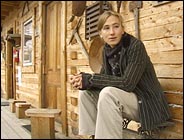kaleidoscope
Catherine Vidal: Branching out
 Catherine Vidal
Catherine Vidal
PHOTO: NFB | |
Is there a place for the "I," as well as the eye, in a documentary? Can the filmmaker be both behind and in front of the camera? Catherine Vidal, a first-year student in East Asian studies and history, thinks so, and proves her point in the film she co-directed and co-starred in with her mother, documentary filmmaker Johanne Fournier.
Larguer les amarres (cutting the ties) is the true story of two women in transition. One is at the beginning of her career as a filmmaker. The other, utterly devoted to her art for the past 21 years, is now taking a moment to reflect, to step out from behind the camera, coming to terms with the question: "Am I living or simply filming life?"
The movie resulted from Vidal's decision to go in the summer of 1998 to Vancouver and the Yukon and document her trip by sending videotaped postcards, letters, works of art and communiqués to her mother, living near Matane in the Gaspé.
Fournier, likewise, made and sent videotaped responses. Three months later, Vidal returned to Montreal and mother and daughter began the six-month-long process of making a 50-minute film from their 30 hours of footage.
As in any creative endeavour, however, there is always a story before the story: Vidal, in her final year of media art and technology at the CEGEP de Jonquière, did an internship at the National Film Board. As an exercise, she wrote a proposal for a film. For some time Vidal and her mother had wanted to make a film together and liked the idea of video-postcards. "The project was doable and it was fun to write as an exercise," says Vidal over cheesecake and camomile tea.
Eventually, after 18 months of developing a hypothetical script and figuring out the logistics of a two-camera, four-hands, three-location operation, the film board agreed to fund the project. "It's a long, bureaucratic process," says Vidal. "All three versions of the script have to be approved by the producer and outside readers."
But Vidal is grateful for the chance she got to make her first film. "I was a wild card for them," she notes.
The film has both a playful side — found largely in Vidal's work — and a refined, staid side found largely in Fournier's corresp-ondence. One of the most moving scenes has the mother sitting in her production room, lit softly with incandescent light, reflecting on the "seriousness" of her filmmaking, something she has suggested her daughter may be lacking. "You are 20 years old; I want you to respond to the big questions."
Visually, this film is never dull, though a few of the transition sequences, such as the rapid-fire shots of Vancouver, might have been a little shorter. It's an arresting study in contrasts: the pastoral life in the Gaspé, marked by hummingbirds, the painting of a veranda and fishing for salmon, versus the newness, speed and bright colours of Vancouver and the rawness of the frontier town and the surrounding wilderness.
It's also a film that never lets you forget the process of filmmaking. There's a funny scene in Dawson City where Vidal is trying to film herself sitting on a store doorstep, speaking to her mother in French, all the while having to warn passers-by: "Watch out for the wire."
It's been almost a year now since the film was finished and Vidal is now in the throes of promoting it. Next Tuesday, for instance, the film will be premiered and Vidal will participate in a debate on the "'I' in documentary cinema."
Now 23, Vidal has opted to suspend filmmaking for a while in order to complete her degree. It's unlikely, however, that she'll be still for long. China and Japan fascinate her and she believes that one "needs much preparation to really enjoy Asia," where she plans one day to travel and direct a film.
Wanting to push her frontiers still farther west, Vidal, who is learning Japanese, has applied for a student-exchange program in Japan, "one of the most different and disorienting places I can go to."
What drives this self-possessed young woman to explore the unknown? "I want to have many branches in my tree," she replies.
Larguer les amarres will be screened at the Cinémathèque Québécoise from February 29 to March 5 at 6:30 pm. For information, phone 842-9763.
 |
||||
|
I expected to find what we found for alcohol — that most kids use it on weekends, that going to school drunk is uncommon. The pattern for marijuana is not the same. |
||||
This Song plays on
 Cannons, a Chinese innovation
Cannons, a Chinese innovation
| |
Restaurants. Fine silk. Gunpowder. Porcelain. Tea. Printing and movable type.
There's no question about it — the world owes a huge debt of gratitude to China's Song Dynasty (960-1280 ad), a society that introduced many innovations that have become staples of contemporary life.
This remarkable period in China's history will be the focus of an instalment of a new Nova miniseries on PBS, Secrets of Lost Empires. The Song segment, entitled "China Bridge," airs on most PBS stations on February 29.
One of the scholars the Nova producers turned to in putting the documentary together was East Asian studies and history professor Robin Yates, an expert on early Chinese history.
Yates, who just earned a Killam Research Fellowship from the Canada Council to study the history of military science and technology in China, told the Nova producers that Song Dynasty-era China "was simply far more developed technologically and culturally than any state in the West."
Yates noted that the Song Dynasty's invention of gunpowder "completely transformed the way wars were waged and contributed to the eventual establishment of might over right.
"In my own research, I have been able to refute the common notion that the Chinese invented gunpowder, but only used it for fireworks. I'm sure that they discovered military uses for it. I have found the earliest illustration of a cannon in the world, which dates from ... around 1127, which was 150 years before the development of the cannon in the West."
Yates says that by the end of the dynasty, the Chinese had come up with the idea of multiple-stage rockets. "If we hadn't had that, maybe we would not have been able to put a man on the moon."
 |
||||
|
We are pushed to consume more than we really need. We have become the true alternative to the mindset that says bigger is better. And to be frank, we are not always welcomed by American builders. This is seen as a threat. |
||||
Wives know best
 STILL: NFB
STILL: NFB
| |
Kevin Dean didn't want to do it.
His wife, filmmaker Torill Kove, had asked Dean, a McGill music professor and an accomplished jazz trumpet player, to supply the music for her professional directorial debut, My Grandmother Ironed the King's Shirts, a whimsical animated tale.
"I thought it was a bad idea for us to work together," says Dean, who says he's wary of mates "hanging wallpaper together," never mind collaborating professionally.
She persisted. He relented.
Dean concedes now that his wife knew what she was doing. You don't argue with an Oscar nominee.
Kove's film, an NFB/Norwegian co-production, is competing for an Academy Award in the short film — animated category.
Dean's contributions to the movie include marching music, a gypsy-type tune and a main score tinged with melancholy. He remembers his initial attempts at putting together the music for the film — armed with a piano, a stopwatch and a VCR, he would time his creations to match different scenes in the movie.
Dean says Kove's Norwegian producer was the one to break the Oscar news. "It was a five-minute conversation. By the time she hung up, there were 14 new messages on the answering machine."
Kove's movie deals with a tale that her grandmother told her as a child — that she ironed the King of Norway's shirts. It turns out to be true — sort of. "I think she's really gifted so I wasn't surprised," Dean says of Kove's nomination.
Dean is now preparing to squire his wife to the Oscar ceremonies in Hollywood next month. It's a black tux affair. Maybe Dean would like to wear a nice McGill tie to go with that?
"No, I don't think so," he laughs.

